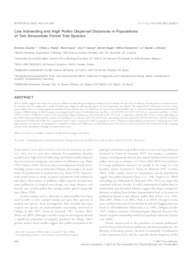Low inbreeding and high pollen dispersal distances in populations of two Amazonian Forest tree species.
Low inbreeding and high pollen dispersal distances in populations of two Amazonian Forest tree species.
Author(s): CLOUTIER, D.; HARDY, O. J.; CARON, H.; CIAMPI, A. Y.; DEGEN, B.; KANASHIRO, M.; SCHOEN, D. J.
Publication year: 2007
Types of publication: Journal article
Observation
Some of Embrapa's publications are published as ePub files. To read them, use or download one of the following free software options to your computer or mobile device. Android: Google Play Books; IOS: iBooks; Windows and Linux: Calibre.
Access other publications
Access the Agricultural Research Database (BDPA) to consult Embrapa's full library collection and records.
Visit Embrapa Bookstore to purchase books and other publications sold by Embrapa.

